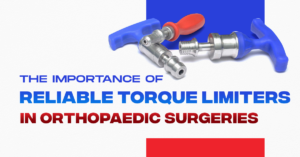Precision and control are paramount, making the role of reliable torque limiters crucial to the success of these complex procedures. Torque limiters, which regulate the amount of rotational force applied during surgery, are essential for ensuring that surgical hardware is tightened to exact specifications, impacting both the immediate surgical outcome and the long-term recovery of the patient. These devices are not merely accessories but are fundamental to maintaining the integrity of the surgical process and achieving optimal patient outcomes.
Torque limiters serve a vital function in ensuring that fixation devices such as screws and plates are tightened with the precise amount of torque required. In orthopaedic procedures like fracture repairs, spinal fusions, and joint replacements, the stability and support provided by these devices are critical. If the fixation hardware is under-tightened, it can lead to inadequate support, potentially causing failure or displacement of the hardware. On the other hand, over-tightening can inflict damage on surrounding tissues and compromise the effectiveness of the fixation. Torque limiters are designed to address this challenge by providing controlled and accurate application of force, ensuring that the hardware is secured to the correct specifications, thus avoiding complications associated with improper tightening.
Beyond the immediate mechanical benefits, torque limiters play a significant role in preventing tissue damage during surgery. Excessive force applied to surgical hardware can lead to severe complications, including damage to the surrounding tissues, bones, and nerves. For instance, in spinal surgeries where screws are used to stabilise the vertebrae, over-tightening can potentially damage the spinal cord or nerves. Torque limiters help mitigate these risks by controlling the amount of force applied, thereby protecting sensitive anatomical structures and reducing the likelihood of complications. This aspect of torque limiters is particularly crucial in complex surgeries where the risk of damage to delicate tissues is higher.
The precision offered by torque limiters is essential for enhancing the overall accuracy of surgical procedures. Surgeons rely on these devices to apply a consistent and controlled amount of force, which contributes significantly to achieving the desired surgical outcomes. In intricate surgeries where alignment and stability of fixation devices are critical, torque limiters provide the accuracy needed to ensure that every adjustment is made with confidence. This precision helps in achieving optimal results, reducing the risk of errors that could compromise the success of the surgery and the patient’s recovery.
Reliable torque limiters also play a crucial role in reducing postoperative complications. One of the common issues that can arise after orthopaedic surgeries is hardware loosening, which can lead to pain, instability, and potentially the need for additional surgical interventions. By ensuring that fixation devices are securely and accurately tightened, torque limiters minimise the risk of such complications. For example, in knee replacement surgeries, torque limiters help secure prosthetic components to the bone with the appropriate amount of force, reducing the likelihood of implant loosening or joint instability post-surgery. This reduction in complications not only contributes to a smoother recovery but also enhances the overall effectiveness of the surgical procedure.
The impact of torque limiters extends to improving the efficiency of surgical procedures. By providing a reliable and consistent means of applying force, these devices help streamline the surgical workflow, reducing the time required to complete procedures. Surgeons can depend on torque limiters to achieve precise results quickly, allowing them to focus on other critical aspects of the surgery. This increased efficiency not only enhances the surgical experience but also contributes to better patient outcomes and faster recovery times. The ability to perform surgeries more efficiently with the aid of reliable torque limiters underscores their importance in modern orthopaedic practice.
For torque limiters to be effective, they must exhibit certain key characteristics. Accuracy is paramount, as reliable torque limiters must provide precise control over the applied force, adhering to specific torque settings to ensure safety and effectiveness. Durability is equally important; torque limiters must be robust enough to withstand the rigours of the surgical environment, resisting wear and tear to maintain long-term performance. Additionally, ease of use is a crucial factor; torque limiters should be designed to integrate seamlessly into the surgical workflow, allowing for straightforward operation by the surgical team. Compliance with established medical standards and regulations is another critical aspect, ensuring that torque limiters meet safety and efficacy requirements for clinical use.
In conclusion, the importance of reliable torque limiters in orthopaedic surgeries is multifaceted and significant. These devices are integral to achieving precise fixation, preventing tissue damage, enhancing surgical accuracy, and reducing postoperative complications. By ensuring controlled and accurate application of force, torque limiters contribute to the success of surgical procedures and improve patient recovery. Investing in high-quality torque limiters reflects a commitment to excellence in surgical care and underscores their indispensable role in modern orthopaedic practice. As surgical techniques continue to advance, the role of torque limiters in maintaining the highest standards of precision and patient safety will remain a cornerstone of successful orthopaedic surgery.
visit our website now now to know more.

